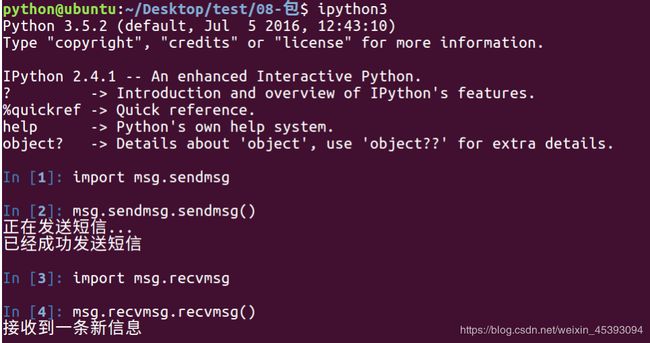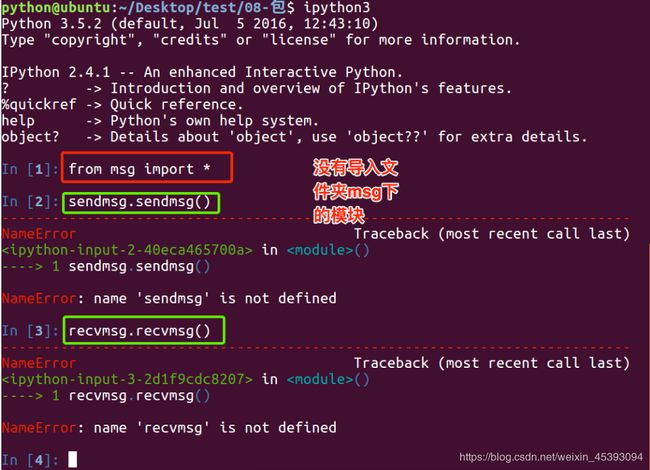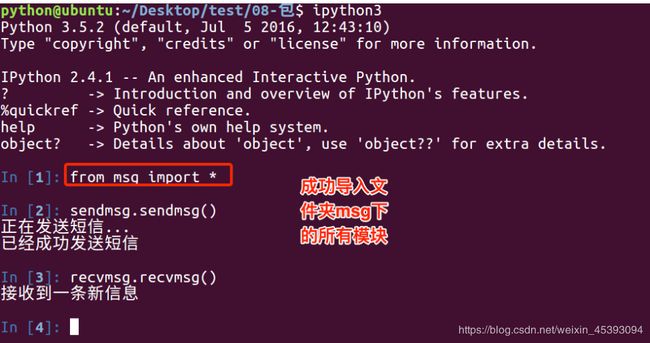Python异常处理(基础详解)
本文是python异常的基础知识,欢迎阅读,一起进步
Python专栏请参考:人生苦短-我学python
文章目录
- 一.异常简介
- 二.捕获异常
- 三.异常的传递
- 四.抛出自定义的异常
- 五.模块
- 六.模块制作
- 七.python中的包
一.异常简介
- 异常是指在语法正确的前提下,程序运行时报错就是异常。
- 当Python脚本发生异常时我们需要捕获处理它,否则程序会终止执行。
print ('-----test--1---')
open('123.txt', 'r')
print ('-----test--2---')
-----test--1---
Traceback (most recent call last):
File "D:/Phython/study/venv/Include/hello.py", line 2, in <module>
open('123.txt', 'r')
FileNotFoundError: [Errno 2] No such file or directory: '123.txt'
Why?-->打开一个不存在的文件123.txt,当找不到123.txt 文件时,就会抛出给我们一个IOError类型的错误,No such file or directory:123.txt (没有123.txt这样的文件或目录)
二.捕获异常
- 捕获异常 try…except…
try:
print('-----test--1---')
open('123.txt','r')
print('-----test--2---')
except IOError:
pass
-----test--1---
- 说明:
- 此程序看不到任何错误,因为用except 捕获到了IOError异常,并添加了处理的方法
- pass 表示实现了相应的实现,但什么也不做;如果把pass改为print语句,那么就会输出其他信息

- 把可能出现问题的代码,放在try中
- 把处理异常的代码,放在except中
- except捕获多个异常
try:
print (num)
except IOError:
print('产生错误了')
Traceback (most recent call last):
File "D:/Phython/study/venv/Include/hello.py", line 2, in <module>
print (num)
NameError: name 'num' is not defined
上例程序,已经使用except来捕获异常了,为什么还会看到错误的信息提示?
- except捕获的错误类型是IOError,而此时程序产生的异常为 NameError ,所以except没有生效
正确写法
try:
print num
except NameError:
print('产生错误了')
产生错误了
- 实际开发中,捕获多个异常的方式,如下:
#coding=utf-8
try:
print('-----test--1---')
open('123.txt','r') # 如果123.txt文件不存在,那么会产生 IOError 异常
print('-----test--2---')
print(num)# 如果num变量没有定义,那么会产生 NameError 异常
except (IOError,NameError):
#如果想通过一次except捕获到多个异常可以用一个元组的方式
print("捕捉到异常")
-----test--1---
捕捉到异常
换个顺序对比一下
#coding=utf-8
try:
print(num)# 如果num变量没有定义,那么会产生 NameError 异常
print('-----test--1---')
open('123.txt','r') # 如果123.txt文件不存在,那么会产生 IOError 异常
print('-----test--2---')
except (IOError,NameError):
#如果想通过一次except捕获到多个异常可以用一个元组的方式
print("捕捉到异常")
捕捉到异常
- 注意: 当捕获多个异常时,可以把要捕获的异常的名字,放到except 后,并使用元组的方式仅进行存储
- 获取异常的信息描述
- else
- 咱们应该对else并不陌生,在if中,它的作用是当条件不满足时执行的实行;同样在try…except…中也是如此,即如果没有捕获到异常,那么就执行else中的事情
try:
num = 100
print(num)
except NameError as errorMsg:
print('产生错误了:%s'%errorMsg)
else:
print('没有捕获到异常,真高兴')
100
没有捕获到异常,真高兴
- try…finally…
- 在程序中,如果一个段代码必须要执行,即无论异常是否产生都要执行,那么此时就需要使用finally。比如文件关闭,释放锁,把数据库连接返还给连接池等。
import time
try:
f = open('test.txt')
try:
while True:
content = f.readline()
if len(content) == 0:
break
time.sleep(2)
print(content)
except:
#如果在读取文件的过程中,产生了异常,那么就会捕获到
#比如 按下了 ctrl+c
print("捕捉到异常")
finally:
f.close()
print('关闭文件')
except:
print("没有这个文件")
没有这个文件
- test.txt文件中每一行数据打印,但是我有意在每打印一行之前用time.sleep方法暂停2秒钟。这样做的原因是让程序运行得慢一些。在程序运行的时候,按Ctrl+c中断(取消)程序。
- 我们可以观察到KeyboardInterrupt异常被触发,程序退出。但是在程序退出之前,finally从句仍然被执行,把文件关闭。
三.异常的传递
- try嵌套中
import time
try:
f = open('test.txt')
try:
while True:
content = f.readline()
if len(content) == 0:
break
time.sleep(2)
print(content)
finally:
f.close()
print('关闭文件')
except:
print("没有这个文件")
- 函数嵌套调用中
def test1():
print("----test1-1----")
print(num)
print("----test1-2----")
def test2():
print("----test2-1----")
test1()
print("----test2-2----")
def test3():
try:
print("----test3-1----")
test1()
print("----test3-2----")
except Exception as result:
print("捕获到了异常,信息是:%s" % result)
print("----test3-2----")
test3()
print("------华丽的分割线-----")
test2()
----test3-1----
----test1-1----
捕获到了异常,信息是:name 'num' is not defined
----test3-2----
------华丽的分割线-----
----test2-1----
----test1-1----
Traceback (most recent call last):
File "D:/Phython/study/venv/Include/hello.py", line 26, in <module>
test2()
File "D:/Phython/study/venv/Include/hello.py", line 9, in test2
test1()
File "D:/Phython/study/venv/Include/hello.py", line 3, in test1
print(num)
NameError: name 'num' is not defined
- 总结:
- ① 如果try嵌套,那么如果里面的try没有捕获到这个异常,那么外面的try会接收到这个异常,然后进行处理,如果外边的try依然没有捕获到,那么再进行传递。
- ②如果一个异常是在一个函数中产生的,例如函数A---->函数B---->函数C,而异常是在函数C中产生的,那么如果函数C中没有对这个异常进行处理,那么这个异常会传递到函数B中,如果函数B有异常处理那么就会按照函数B的处理方式进行执行;如果函数B也没有异常处理,那么这个异常会继续传递,以此类推。。。如果所有的函数都没有处理,那么此时就会进行异常的默认处理,即通常见到的那样。
- ③注意观察上图中,当调用test3函数时,在test1函数内部产生了异常,此异常被传递到test3函数中完成了异常处理,而当异常处理完后,并没有返回到函数test1中进行执行,而是在函数test3中继续执行
四.抛出自定义的异常
- 你可以用raise语句来引发一个异常。异常/错误对象必须有一个名字,且它们应是Error或Exception类的子类
下面是一个引发异常的例子:
class ShortInputException(Exception):
'''自定义的异常类'''
def __init__(self, length, atleast):
#super().__init__()
self.length = length
self.atleast = atleast
def main():
try:
s = input('请输入 --> ')
if len(s) < 3:
# raise引发一个你定义的异常
raise ShortInputException(len(s), 3)
except ShortInputException as result:#x这个变量被绑定到了错误的实例
print('ShortInputException: 输入的长度是 %d,长度至少应是 %d'% (result.length, result.atleast))
else:
print('没有异常发生.')
main()
情况1
请输入 --> hello
没有异常发生.
情况2
请输入 --> la
ShortInputException: 输入的长度是 2,长度至少应是 3
- 注意
- 以上程序中,关于代码#super().init()的说明
- 这一行代码,可以调用也可以不调用,建议调用,因为__init__方法往往是用来对创建完的对象进行初始化工作,如果在子类中重写了父类的__init__方法,即意味着父类中的很多初始化工作没有做,这样就不保证程序的稳定了,所以在以后的开发中,如果重写了父类的__init__方法,最好是先调用父类的这个方法,然后再添加自己的功能
五.模块
- Python中的模块有过C语言编程经验的朋友都知道在C语言中如果要引用sqrt函数,必须用语句#include
引入math.h这个头文件,否则是无法正常进行调用的。
那么在Python中,如果要引用一些其他的函数,该怎么处理呢?
- 在Python中有一个概念叫做模块(module),这个和C语言中的头文件以及Java中的包很类似,比如在Python中要调用sqrt函数,必须用import关键字引入math这个模块,下面就来了解一下Python中的模块。
- 说的通俗点:
模块就好比是工具包,要想使用这个工具包中的工具(就好比函数),就需要导入这个模块
- import
- 在Python中用关键字import来引入某个模块,比如要引用模块math,就可以在文件最开始的地方用import math来引入。
import module1,mudule2...
- 当解释器遇到import语句,如果模块在当前的搜索路径就会被导入。
- 在调用math模块中的函数时,必须这样引用:
模块名.函数名
什么必须加上模块名调用呢 ?
- 因为可能存在这样一种情况:在多个模块中含有相同名称的函数,此时如果只是通过函数名来调用,解释器无法知道到底要调用哪个函数。所以如果像上述这样引入模块的时候,调用函数必须加上模块名。
import math
#这样会报错
print sqrt(2)
#这样才能正确输出结果
print math.sqrt(2)
- 有时候我们只需要用到模块中的某个函数,只需要引入该函数即可,此时可以用下面方法实现:
from 模块名 import 函数名1,函数名2....
- ①通过这种方式引入的时候,调用函数时只能给出函数名,不能给出模块名,但是当两个模块中含有相同名称函数的时候,后面一次引入会覆盖前一次引入。也就是说假如模块A中有函数function(),在模块B中也有函数function(),如果引入A中的function在先、B中的function在后,那么当调用function函数的时候,是去执行模块B中的function函数。
- ②如果想一次性引入math中所有的东西,还可以通过
from math import *来实现
- from…import
- Python的from语句让你从模块中导入一个指定的部分到当前命名空间中
- 语法如下:
from modname import name1[, name2[, ... nameN]]
- 例如,要导入模块fib的fibonacci函数,使用如下语句:
from fib import fibonacci
- 注意:不会把整个fib模块导入到当前的命名空间中,它只会将fib里的fibonacci单个引入
from … import *- 把一个模块的所有内容全都导入到当前的命名空间也是可行的,只需使用如下声明:
from modname import *
- 注意:这提供了一个简单的方法来导入一个模块中的所有项目。然而这种声明不该被过多地使用。
- as
import time as tt
time.sleep(1)
Traceback (most recent call last):
File "D:/Phython/study/venv/Include/hello.py", line 2, in <module>
time.sleep(1)
NameError: name 'time' is not defined
- 定位模块
当你导入一个模块,Python解析器对模块位置的搜索顺序是:- ①当前目录
- ②如果不在当前目录,Python则搜索在shell变量PYTHONPATH下的每个目录。
- ③如果都找不到,Python会察看默认路径。UNIX下,默认路径一般为/usr/local/lib/python/
- ④模块搜索路径存储在system模块的sys.path变量中。变量里包含当前目录,PYTHONPATH和由安装过程决定的默认目录。
六.模块制作
- 定义自己的模块
- 在Python中,每个Python文件都可以作为一个模块,模块的名字就是文件的名字。
比如有这样一个文件test.py,在test.py中定义了函数add test.py
def add(a, b):
return a + b
- 调用自己定义的模块
- 那么在其他文件中就可以先import test,然后通过test.add(a,b)来调用了,当然也可以通过from test import add来引入
main.py
import test
result = test.add(11, 22)
print(result)
test.py
def add(a, b):
return a + b
# 用来进行测试
ret = add(12, 22)
print('int test.py file,,,,12+22=%d' % ret)
int test.py file,,,,12+22=34
- 如果此时,在其他py文件中引入了此文件的话,想想看,测试的那段代码是否也会执行呢!
import test
result = test.add(11, 22)
print(result)
int test.py file,,,,12+22=34
33
七.python中的包
- (1)引入包
- 有2个模块功能有些联系
- 所以将其放到同一个文件夹下
- 使用import 文件.模块 的方式导入
- 使用from 文件夹 import 模块 的方式导入
- 在msg文件夹下创建__init__.py文件
- 在__init__.py文件中写入
- 重新使用from 文件夹 import 模块 的方式导入
- 总结: 包将有联系的模块组织在一起,即放到同一个文件夹下,并且在这个文件夹创建一个名字为__init__.py 文件,那么这个文件夹就称之为包,有效避免模块名称冲突问题,让应用组织结构更加清晰
- (2)init.py文件有什么用
__init__.py 控制着包的导入行为
- init.py为空
- 仅仅是把这个包导入,不会导入包中的模块
- __ all__
- 在__init__.py文件中,定义一个__all__变量,它控制着 from 包名 import *时导入的模块
- 可以在__init__.py文件中编写内容
- 可以在这个文件中编写语句,当导入时,这些语句就会被执行
- 最后小结几个常见异常
| 异常 | 解释 |
|---|---|
| AttributeError | 当你访问一个对象的属性,但是这个属性并没有在这个对象定义的时候,就会引发 AttributeError |
| ImportError | 在使用 import 导入模块时,如果要导入的模块找不到,或者从模块中导入模块中不存在的内容 |
| IndexError | 当你尝试从序列(如列表或元组)中检索索引,但是序列中找不到该索引。此时就会引发 IndexError |
| KeyError | 与 IndexError 类似,当你访问映射(通常是 dict )中不包含的键时,就会引发 KeyError。 |
| NameError | 当你引用了变量、模块、类、函数或代码中没有定义的其他名称时,将引发 NameError。 |
| SyntaxError | 当代码中有不正确的 Python 语法时,就会引发 SyntaxError。下面的问题是函数定义行末尾缺少一个冒号 |
| TypeError | 当你的代码试图对一个无法执行此操作的对象执行某些操作时,例如将字符串添加到整数中,以及一开始的例子使用 append 方法给元组添加元素,这些都会引发 TypeError。 |
| ValueError | 当对象的值不正确时就会引发 ValueError。这个和我们前面说的因为索引的值不在序列的范围内,而导致 IndexError 异常类似。 |
The best investment is in yourself

2020.04.06 记录辰兮的第49篇博客


















